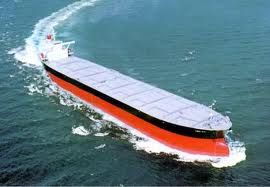
Capesize shipping contracts tied to the cost of transporting iron ore and coal rose to a nine-week high as traders speculate on a seasonal increase in cargo in the second half of the year.
July-to-September forward freight agreements, or FFAs, used by traders to hedge, or bet on, future charter costs for capesize ships rose by as much as 9 per cent to US$11,850 a day, according to data from Clarkson Securities Ltd, a London-based unit of the world's biggest shipbroker. That's the highest level since April 27.
'I expect to see the usual strong increase in the amount of iron ore shipped in the next six months, relative to the first half of the year,' John D'Ancona, senior researcher at Galbraith's Ltd, a London- based shipbroker, said on Monday. While anticipation of extra cargo explains why FFAs are rising, further gains will likely be 'fairly muted', he said.
Increased Australian ore shipments to China, the world's largest importer, last month helped sustain a rally that's boosted capesize rental rates 54 per cent since June 14. The Asian country imported the steelmaking material from as far afield as Iran and Mexico in the last six months, because of a supply shortage from traditional sources that would soon ease, Mr D'Ancona said.
Weather-related disruptions earlier this year curtailed output from Australia and Brazil, the two largest iron ore suppliers, while monsoons in India also cut Chinese ore imports, he said.
Rental rates for capesizes gained 0.3 per cent on Monday to US$13,235 a day, the highest since Jan 6, according to the London-based Baltic Exchange, which tracks international freight costs on more than 50 shipping routes.
The Baltic Dry Index, a broader measure of commodity costs, was 0.2 per cent lower, at 1,419 points as costs for three smaller ship types assessed by the gauge fell across 19 of 20 routes.
The fleet of 1,237 capesize vessels, so called because they're too big to use the Panama Canal and must steam around Cape Horn or the Cape of Good Hope, hauls almost two-thirds of the iron ore carried at sea, according to data from Germany's DVB Bank SE. It estimates about one billion tonnes of annual seaborne trade is carried out in the steelmaking raw material.
Source: Bloomberg
We use cookies to improve your experience. By continuing to use our site, you accept our Cookies, Privacy Policy,Terms and Conditions. Close X